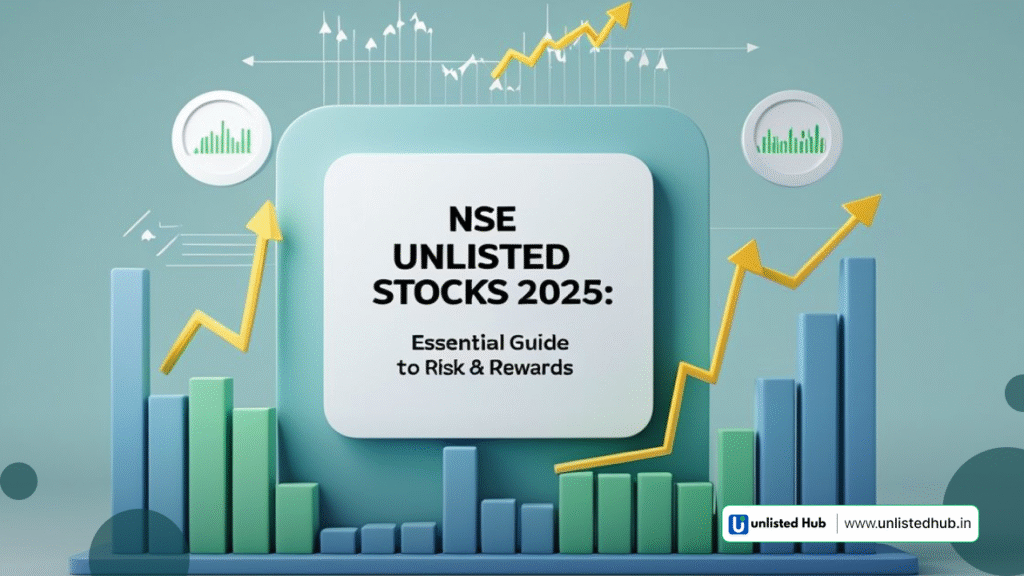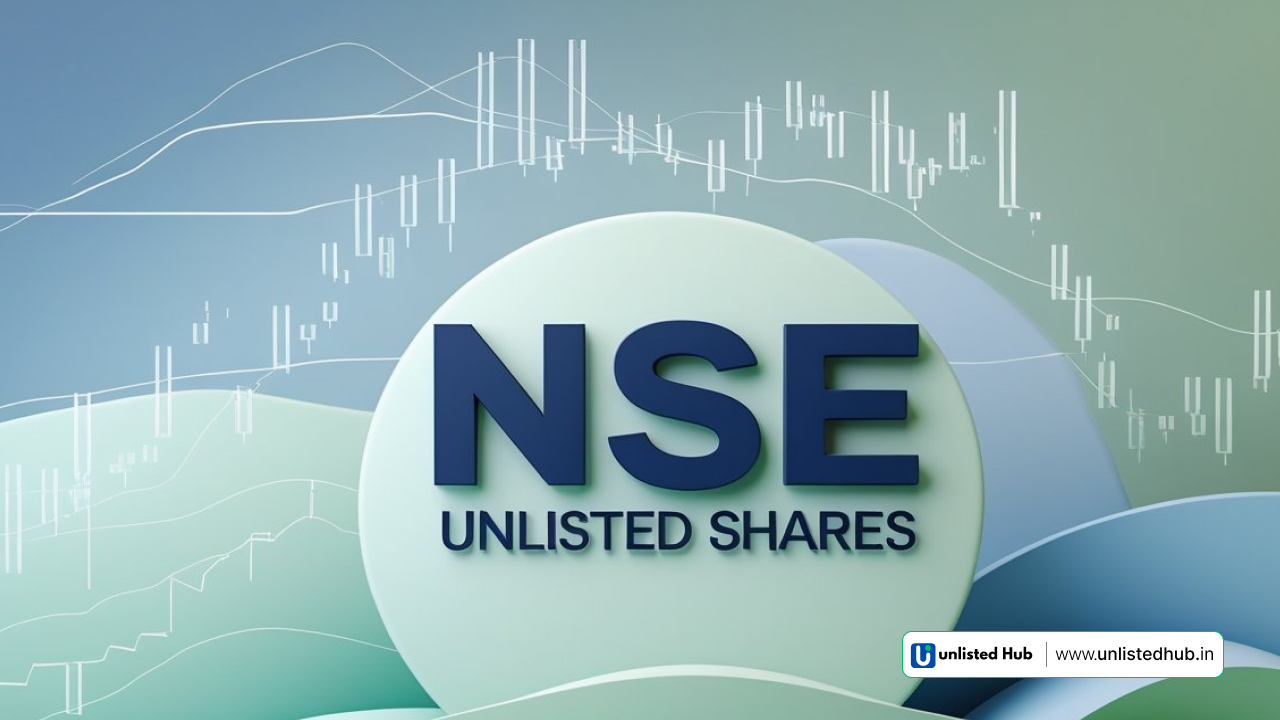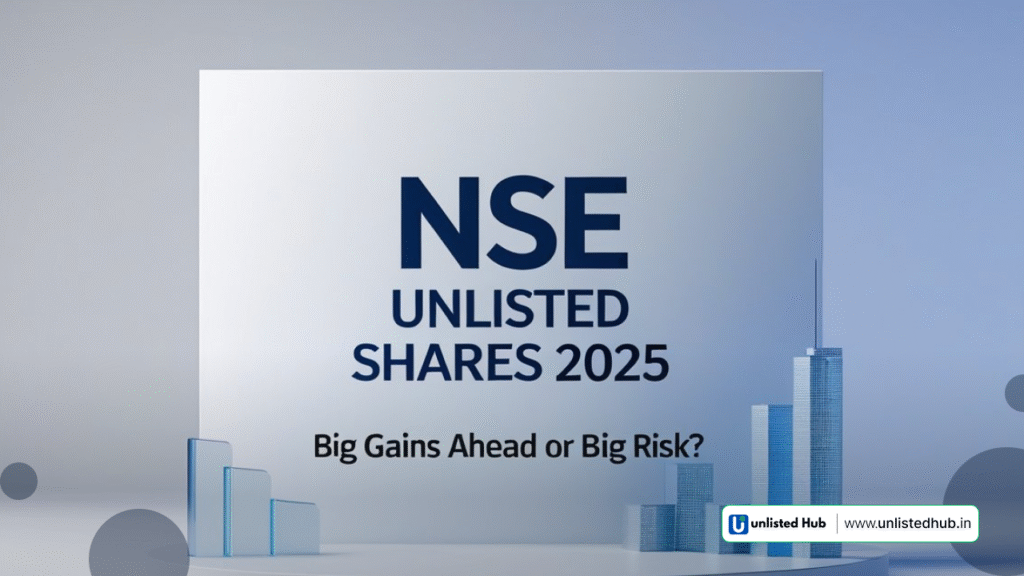SECTION A: What Are NSE Unlisted Stock?
=> NSE unlisted stock are shares of companies that are not listed on the stock exchange but are traded privately among investors.
=> These shares give investors a chance to invest in companies before they go public.
=> In simpler words, they are like getting early access to a company’s stock before everyone else.
=> Investing in these shares can be exciting because of the potential high returns.
=> But they also carry some risks, which is why understanding them is important.
~ Key Points About NSE Unlisted Stock
| Feature | Explanation | Example |
| Type | Private company shares not listed on NSE | Startups, growing tech firms |
| Access | Only available through authorized platforms or private deals | Unlisted Hub, Unlisted Ideas |
| Purpose | Helps companies raise funds before IPO | Expansion, new projects |
| Potential Returns | Can give higher returns compared to listed shares | 50-150% gain over time |
| Risk | Limited liquidity and market price not fixed | Hard to sell quickly if needed |
| Investors | Retail and institutional investors | Angel investors, retail investors |
~ Benefits of Investing in NSE Unlisted Stock
- Early Access to Companies: Investing before IPOs allows you to become a part of a company’s growth journey early.
- High Return Potential: Since these shares are bought at pre-IPO prices, profits can be substantial if the company grows.
- Diversification: Unlisted equity adds variety to your investment portfolio beyond traditional stocks and mutual funds.
~ How NSE Unlisted Stock Work
- Private Transactions: These shares are usually sold through private deals between the seller and buyer.
- Authorized Platforms: Platforms like Unlisted Hub, help retail investors buy and sell NSE unlisted stocks safely.
- Valuation: Companies often set the share price based on current financials, projected growth, and market demand.
~ Points to Keep in Mind
- Liquidity Challenges: Selling shares can be harder compared to shares on NSE.
- Market Price Uncertainty: Prices are not regulated, so valuation depends on negotiation and company performance.
- Regulatory Compliance: Only SEBI-approved platforms should be used to avoid fraud.
~ Quick Tips for Retail Investors
- Check the company’s growth history and future plans before investing.
- Always buy through authorized platforms to ensure safety.
- Keep track of market trends for pre-IPO shares to make informed decisions.
SECTION B: Why Retail Investors Are Interested in Unlisted Stock
=> NSE unlisted stock have become a hot topic for retail investors in recent years.
=> With more investors looking for early opportunities, unlisted stock are offering unique chances to grow wealth before a company goes public.
=> Here’s why retail investors are showing interest in these high-potential investments.
~ Key Reasons for Retail Investor Interest
| Reason | Explanation | Benefits |
| Early Access to Companies | Retail investors can invest in companies before their IPO. | Potential for high returns once shares list publicly. |
| High-Growth Investments | Many shares are from startups or fast-growing firms. | Chance to be part of a company’s growth journey. |
| Pre-IPO Investing | Investors get a head start in buying shares at lower valuations. | Opportunity to buy before market demand drives prices up. |
| Diversification | Adds variety to an investor’s portfolio. | Reduces risk by not relying solely on listed stocks. |
| Exclusive Opportunities | Some shares are not available to everyone. | Creates a sense of exclusivity for retail investors. |
~ Easy Benefits for Retail Investors
- Potential for Higher Returns: Since shares are bought at pre-IPO prices, investors can enjoy significant price appreciation after listing.
- Early Entry: You can invest in promising companies before the general public.
- Growing Platforms: Many online platforms now allow safe trading of unlisted stock.
- Learning Experience: Helps retail investors understand company growth, market trends, and investment dynamics.
~ How Retail Investors Can Approach NSE Unlisted Stock
- Research Before Investing: Check company background, growth potential, and management.
- Start Small: Begin with a manageable amount until you understand the market.
- Use Trusted Platforms: Only buy shares through authorized NSE unlisted stock platforms.
- Track Market Trends: Stay updated on news, IPO announcements, and sector growth.
Quick Overview
| Factor | Importance |
| Liquidity | Unlisted shares may be harder to sell, so timing is key. |
| Valuation | Pre-IPO investing allows lower entry but needs research. |
| Risk | Higher risks than listed shares, but rewards can be bigger. |
| Growth Potential | Fast-growing companies offer a chance for large gains. |
=> Retail investors are increasingly exploring retail investor opportunities such as pre-IPO investing and high-growth investments.
=> These options allow small investors to access companies that were previously limited to big players.
=> By using a combination of careful research, trusted platforms, and awareness of market trends, retail investors can make informed choices when dealing with NSE unlisted stock.
SECTION C: Top NSE Unlisted Stock to Watch in 2025
=> Investing in NSE unlisted stock has become a popular choice for retail investors looking for high-growth opportunities before companies go public.
=> These shares offer potential early returns but require careful selection.
=> Below are some trending unlisted shares and investment picks that are catching attention in 2025.
~ Key NSE Unlisted Share to Watch
| Company Name | Industry | Growth Potential | Key Highlights |
| NCDEX | Commodity Exchange | High | Experienced management, strong market presence, rapid valuation growth |
| OYO | Hospitality | Medium-High | Potential IPO, recovering revenue streams, popular brand |
| Urban Company | Services | High | Strong investor backing, expanding user base, increasing demand |
| TechD Cybersecurity | IT/Security | High | Niche market, innovative solutions, increasing corporate clients |
| InCred Money | Fintech | Medium | Facilitates unlisted share trading, good platform for retail investors |
~ Why These Shares Are Trending
- Early Investment Opportunity: Investors can buy shares before the company lists publicly, often at lower valuations.
- High Growth Potential: Many of these companies operate in growing sectors, such as tech, hospitality, and fintech.
- Strong Investor Interest: Platforms and retail investors are actively looking for NSE pre-IPO stocks to diversify portfolios.
- Market Buzz: Companies like OYO and Urban Company are constantly in the news for growth updates, making them trending unlisted shares.
~ Benefits of Watching NSE Unlisted Stock
- Potential High Returns: Early investment in stock can lead to significant profits post-IPO.
- Diversified Portfolio: Adding shares to a portfolio allows investors to spread risk across emerging industries.
- Accessibility: Modern investment platforms make it easier for retail investors to buy and sell unlisted shares.
~ Points to Keep in Mind Before Investing
- Check Company Valuation: Ensure the unlisted share price is reasonable based on revenue and growth.
- Understand Liquidity: Unlisted share may take time to sell if the market demand is low.
- Research Management and Performance: Companies with strong leadership and consistent growth are safer investment picks.
- Follow Regulatory Guidelines: Always use authorized platforms to trade NSE unlisted stock.
~ Summary Table for Investors
| Feature | Importance | Tip |
| Growth Potential | High | Look for companies with rapid expansion or upcoming IPOs |
| Industry | Medium | Tech, Fintech, and Services sectors are trending |
| Liquidity | Medium-Low | Check platform policies for selling unlisted shares |
| Investment Risk | High | Conduct due diligence before investing |
| Popularity | High | Trending unlisted shares attract more investor interest |
SECTION D: Benefits of Investing in NSE Unlisted Stock
=> Investing in NSE unlisted stocks is gaining popularity among retail investors.
=> These shares are not yet listed on stock exchanges, but they offer many advantages for those looking to grow their money smartly.
~ Key Benefits Table
| Benefit | What It Means | Why It Matters |
| High Returns | Potential to earn more than listed shares | Early access to companies before public listing can increase gains |
| Early-Stage Investing | Invest in companies in growth phase | Be part of a business’s success from the start |
| Portfolio Diversification | Spread investments across assets | Reduces risk from relying on one type of investment |
| Limited Competition | Fewer investors can buy | Better chance to invest at fair prices |
| Strategic Investment | Choose companies with strong growth | Increases chances of long-term wealth |
| Access to Emerging Sectors | Invest in growing industries | Capture trends before they become mainstream |
| Less Market Volatility | Not affected by daily stock movements | Provides stability for investors |
~ Benefits Explained
1. High Returns Potential
-> Investing in NSE unlisted stock can give higher returns than regular stocks. Buying before the company lists publicly often results in good profits as the company grows.
2. Early-Stage Investing
-> You get a chance to invest when the company is still expanding. Early investors can benefit more as the company achieves success.
3. Portfolio Diversification
-> Adding shares to your investments spreads risk. Pairing them with listed stocks or mutual funds makes your portfolio stronger.
4. Limited Competition
-> Fewer people can buy shares, so you may get better prices and opportunities to invest in promising companies.
5. Strategic Investment Opportunities
-> You can choose companies based on their growth potential and management quality. This helps make informed decisions aligned with your financial goals.
6. Access to Emerging Sectors
-> Unlisted share often belong to new or fast-growing industries. Investing early can help you benefit from trends before they become popular.
7. Stability from Market Volatility
-> Since shares are not traded daily on exchanges, they are less affected by stock market ups and downs. This provides more stable growth.
SECTION E: Risks Associated with NSE Unlisted Stock
=> NSE unlisted stock can be attractive for investors seeking high returns, but they come with certain risks that every retail investor should be aware of.
=> Understanding these risks is crucial before making any investment decision.
| Risk Type | What It Means | Impact on Investors |
| Liquidity Issues | Difficulty in buying or selling shares quickly | Investors may struggle to exit their position when needed |
| Valuation Uncertainties | No publicly available market price | Hard to know if the price is fair or overvalued |
| Company Performance Risk | Company may not perform as expected | Potential loss of investment if business fails |
| Regulatory Risk | Changes in SEBI or government rules | Could affect the legality or profitability of investments |
| Fraud or Scams | Investment platforms or companies may be untrustworthy | Risk of losing money if the platform is unauthorized |
| Limited Information | Lack of transparent financial reporting | Makes it harder to analyze the company’s true value |
~ Key Risks Explained
- Liquidity Issues: Unlike listed shares, unlisted shares cannot be sold on a stock exchange. This can make it hard for investors to convert their investment into cash quickly. Sometimes, it may take months or even years to find a buyer.
- Valuation Uncertainties: Because NSE unlisted stock do not have a market-determined price, the value of your investment is uncertain. Investors often rely on estimated valuations provided by platforms or the company, which can sometimes be misleading.
- Company Performance Risk: Investing in unlisted companies carries the risk that the company may underperform or fail to meet growth expectations. This can lead to significant losses if the business does not succeed as projected.
- Regulatory Risk: Changes in government regulations or SEBI policies can impact the trading, valuation, or even legality of unlisted share transactions. Retail investors need to stay updated with the latest rules to avoid potential issues.
- Fraud or Scams: Some unlisted share platforms may not be authorized or may offer fraudulent schemes. Always verify the platform’s authenticity before investing to avoid losing money.
- Limited Information: Public companies are required to share financial statements and performance reports. Unlisted companies, however, may provide minimal information, making it difficult to assess the company’s health and growth potential.
~ Quick Tips to Mitigate Risks
- Conduct thorough research on the company and platform.
- Understand the investment risks, liquidity issues, valuation uncertainties before investing.
- Consult financial experts if unsure about the investment.
- Avoid investing large amounts in a single unlisted share.
SECTION F: How to Buy and Sell NSE Unlisted Stock
=> NSE unlisted stock are gaining popularity among retail investors looking to get early access to high-growth companies.
=> Buying and selling these shares is different from investing in listed stocks.
=> Here’s a simple guide to help you understand the process easily.
Step 1: Understand NSE Stock
- Unlisted stock are stocks of companies that are not yet listed on the stock exchange.
- They are also called pre-IPO shares.
- Investors buy these shares for potential high returns when the company lists publicly.
| Feature | What It Means |
| Liquidity | Harder to sell than listed shares |
| Returns | Potentially higher if company grows |
| Access | Requires authorized platforms or brokers |
Step 2: Choose Authorized Platforms
=> To trade NSE unlisted stock safely:
- Use only authorized platforms or brokers approved by SEBI.
- Avoid unauthorized marketplaces to reduce fraud risk.
| Platform | Features |
| UnlistedZone | Easy access, verified sellers |
| InCred Money | Secure transactions, market insights |
| SEBI-approved brokers | Official compliance, lower risk |
Step 3: Check the Investment Process
=> Before investing, understand the trading shares, authorized platforms, investment process:
- Verify the company’s financials and growth potential.
- Confirm the share price and seller legitimacy.
- Complete KYC and registration on the platform.
- Transfer funds securely through the platform’s payment gateway.
| Step | Action |
| 1 | Register and verify KYC |
| 2 | Browse available unlisted shares |
| 3 | Confirm seller and share price |
| 4 | Make payment securely |
Step 4: Buying NSE Unlisted Stock
- Identify companies with upcoming IPOs or strong growth potential.
- Place your order through the authorized platform.
- Keep all transaction documents and confirmations safely.
- Track your investment periodically to know when to sell.
| Tip | Why It Matters |
| Due diligence | Reduces investment risk |
| Secure platform | Ensures safe trading |
| Transaction records | Helps in future resale or tax purposes |
Step 5: Selling NSE Unlisted Stock
- Selling depends on buyer availability on authorized platforms.
- Some platforms provide a secondary market for unlisted share.
- Ensure pricing is fair and matches market trends.
- Always complete transactions through verified methods.
| Selling Tip | Benefit |
| Use secondary market | Easier to find buyers |
| Verify buyer identity | Avoid fraud |
| Keep payment proof | Safe record for future |
SECTION G: Regulations and Compliance for Retail Investors
=> NSE unlisted stock are becoming increasingly popular among retail investors, but understanding the rules and regulations around them is crucial before making any investment.
=> Following proper compliance ensures safety, transparency, and smooth transactions.
=> Investors need to be aware of SEBI guidelines, unlisted share regulations, and investor protection measures when trading these shares.
=> Here’s a simplified overview to help you navigate the compliance requirements easily.
~ Key Compliance Areas
| Compliance Area | What It Means | Why It’s Important |
| Authorized Platforms | Only use SEBI-registered platforms to buy/sell NSE unlisted stock | Ensures legal safety and reduces fraud risk |
| KYC Verification | Complete Know Your Customer (KYC) before investing | Confirms identity and prevents money laundering |
| Disclosure Norms | Companies must share financials, performance, and other key info | Helps investors make informed decisions |
| Lock-in Periods | Some shares may have a restricted selling period | Protects early investors and maintains stability |
| Transaction Records | Maintain proper records of all trades | Useful for audits and tax compliance |
~ Important Points Retail Investors Should Know
- SEBI Guidelines: All unlisted share transactions must follow SEBI regulations to protect investors from scams and irregularities.
- Risk Awareness: Unlike listed shares, NSE unlisted stock may have limited liquidity and higher volatility. Investors must check company performance before investing.
- Authorized Brokers Only: Always trade through approved platforms or brokers to avoid illegal transactions.
- Tax Compliance: Keep track of gains and file taxes according to Indian regulations.
- Documentation: Ensure all agreements, payment receipts, and share certificates are properly documented.
~ Steps to Ensure Compliance
1. Verify Platform Registration – Confirm that the trading platform is SEBI-approved.
2. Complete KYC – Submit valid identity proof, address proof, and PAN details.
3. Check Company Disclosures – Look for audited financial statements, annual reports, and other regulatory filings.
4. Understand Lock-in Periods – Know when you can sell your shares to avoid penalties.
5. Keep Records – Maintain digital or physical copies of all transactions.
~ Benefits of Following Regulations
- Reduces risk of fraud and scams
- Provides legal protection in case of disputes
- Helps track investment performance effectively
- Ensures smoother taxation and audit processes
SECTION H: Tips for Successful Unlisted Share Investments
=> Investing in NSE unlisted stock can be rewarding if done carefully.
=> These shares give retail investors a chance to enter companies before they go public.
=> However, it’s essential to approach them strategically.
=> Here are practical tips to help you make informed decisions.
1. Research Thoroughly
- Check the company’s background, financial performance, and growth potential.
- Look for any pending IPO plans or regulatory approvals.
- Understand the sector and how the company compares with its competitors.
2. Conduct Due Diligence
- Verify if the platform or broker facilitating the transaction is authorized by SEBI.
- Check the legal status of the shares and any restrictions on resale.
- Assess the company’s management, revenue, and expansion plans.
3. Monitor Market Trends
- Track industry trends to know which sectors are growing fast.
- Look for news, announcements, and government policies that could affect share prices.
- Compare similar unlisted companies to understand market valuation.
4. Assess Risks and Risk Management
- Unlisted share may have low liquidity, meaning they are harder to sell quickly.
- Valuations can be volatile since there’s no public market price.
- Always diversify investments to minimize potential losses.
5. Choose the Right Platform
- Use verified platforms or brokers authorized by SEBI for buying and selling.
- Avoid unofficial marketplaces or social media groups offering unlisted share.
- Check fees, transaction rules, and support services before investing.
6. Set Investment Goals
- Decide if you’re investing for short-term gains or long-term growth.
- Define the maximum amount you are willing to invest.
- Regularly review your portfolio to adjust investments based on company performance.
7. Understand Pricing and Valuation
- Compare the company’s unlisted share price with similar companies in the industry.
- Know that pre-IPO shares can fluctuate widely due to demand and supply.
- Avoid investing based solely on hype; focus on fundamentals.
8. Keep Track of Updates
- Subscribe to company announcements and financial news.
- Stay informed about upcoming IPOs that could impact share liquidity.
- Review quarterly results and operational changes in the company.
~ Reference Table for NSE Unlisted Stock
| Tip | What It Means | Key Action Points |
| Research Thoroughly | Know the company and sector | Study financial reports, check competitors |
| Conduct Due Diligence | Verify authenticity and compliance | Check SEBI authorization, legal status |
| Monitor Market Trends | Understand industry growth | Follow news, compare valuations |
| Risk Management | Minimize losses | Diversify portfolio, avoid high-risk exposure |
| Choose Platform | Safe transactions | Use authorized brokers/platforms |
| Set Investment Goals | Clarify purpose | Short-term vs long-term, investment limit |
| Understand Pricing | Evaluate share value | Compare with industry, avoid hype |
| Track Updates | Stay informed | Company announcements, quarterly reports |
FREQUNTLY ASKED QUESTIONS

Other Investors Are Exploring
NSE unlisted share price today || NSE unlisted share valuation || NSE unlisted share trading platforms || NSE unlisted share IPO news || NSE unlisted share liquidity || NSE unlisted share risk management || NSE unlisted share due diligence || NSE unlisted share market trends || NSE unlisted share investment tips || NSE unlisted share regulations





